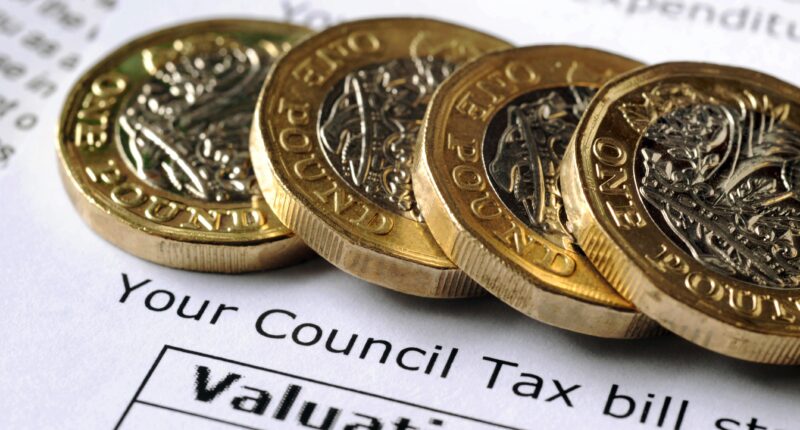MILLIONS of households could end up paying thousands more for bills, here’s how to avoid it.
Many of us are battling with rising energy, grocery and other essential costs.
As a result, struggling households could end up falling behind on bills.
But there’s one payment in particular that you should avoid falling behind on, as you could be asked to pay thousands of pounds upfront.
Council tax is one of the biggest bills Brits fork out cash on – and one we struggle the most to pay.
According to Stepchange, council tax was the most common type of arrears among those struggling with debt in 2021.


The average council tax arrears held by clients was £1,689, up from £1,578 in 2021.
Richard Lane, director of external affairs at StepChange, said: “Council tax debt is a common problem among new StepChange clients – last year over a third (36%) of clients were in arrears.
“Council tax debt is often escalated to enforcement agents, commonly known as bailiffs, often without enough consideration of whether this is appropriate for people who actually need help with their debts.”
But it’s what’s known as a priority debt, which means it has among the worst consequences for not paying.
Most read in Money
Not paying it can result in court action or even imprisonment in the worst case, and local authorities also have the power to send bailiffs to your home.
Usually you pay council tax in monthly instalments over 10 or 12 months.
But if you fall behind you can be asked to pay the entire outstanding balance at once upfront.
As of this month, council tax bills will rise by an average of 5.1%.
The average bill will be £2,065 in 2023-24 – an increase of £99 on the previous year.
The biggest annual percentage rise will be in London, where bills for an average band D property will increase by 6.2%.
Households in metropolitan areas outside London will see bills rise by 5.1% to an average of £2,059.
But largely rural parts of the country will see an increase of 5% to just below £2,140.
If you fall behind now, you could be liable for the entire 12 month bill as new bills have just been sent out.
If you are worried that you’ll fall behind, take action as soon as possible so you aren’t racking up even more debt.
It’s always worth contacting your local council and explain your situation, the may be able to help.
Here’s some of the help you could get.
More council tax support
Council tax discounts
There are a number of discounts you could get, depending on your circumstances.
Factors such as your household income, whether you have children, and if you receive any benefits, will influence what you get.
To apply for any of the below discounts, go through the government website.
You’ll need your national insurance number, bank statements, a recent payslip or letter from the Jobcentre, and a passport or driving licence when filling out the details.
If you are not sure which local authority you live in, you can check the government’s council locator to find out.
Challenge your band
Another way to reduce your bills is to challenge your council tax band – but only if you think you’re wrongly in a higher band and paying more than you should be.
It’s worth noting that challenging your council tax is not a sure-fire way to reduce your bills.
You’ll also need to do your research first as it could result in you, and your neighbours, paying more if you’re bumped up to a higher band instead
The first step is to check what council tax band your neighbours are on, based on houses that are similar in size and value.
This information is available online and is free to check, so you don’t need to ask your neighbours in person.
Use the Gov.uk website to do this for houses in England, or the Scottish Assessors Association for properties in Scotland.
If you find you’re on a higher council tax band compared to your neighbours, you may be able to successful make a challenge.
But before you do, another crucial check is to see how much your property was worth in 1991, as this is when council tax was launched by the government.
But make sure you’re aware that if you are found to be paying less, then you’ll have to pay whatever is owed.
It’s always worth checking but in some cases, you might end up paying back rather than getting a refund.
Single people
If you live on your own, you can get 25% off your council tax bill.
This also applies if there is one adult and one student living together in a property, or if there is one adult and one person classed as severely mentally impaired in the home.
If you live with someone who doesn’t have to pay council tax, such as a carer or someone who is severely mentally impaired, you could get a larger reduction too, of up to 50%.
And, if you live in an all-student household, you could get a 100% discount.
A full list of circumstances that exempt you from paying council tax can be found on Citizens Advice.
Retirees
Pensioners may also find themselves eligible for a council tax reduction.
If you receive the Guarantee Credit element of Pension Credit, you could get a 100% discount.
If not, you could still get help if you have a low income and less than £16,000 in savings.
And a pensioner who lives alone will be entitled to a 25% discount too.
Low-income households
If you are on a low income or receiving benefits, you could eligible for a reduction on your council tax.
Whether you are eligible will vary depending on where you live.
You could also get a deferral if you’re struggling to pay your bill, or you can speak to your council about setting up a payment plan to manage the cost.
But one thing to remember is if you are struggling you should contact your council as early as you can.
As well as being a priority bill, missing one council tax payment could mean you become liable for your entire annual bill in one go.


There are plenty of organisations where you can seek debt advice for free, including:
- National Debtline – 0808 808 4000
- Step Change – 0800 138 1111
- Citizens Advice – 0808 800 9060
Do you have a money problem that needs sorting? Get in touch by emailing [email protected]
This post first appeared on thesun.co.uk









